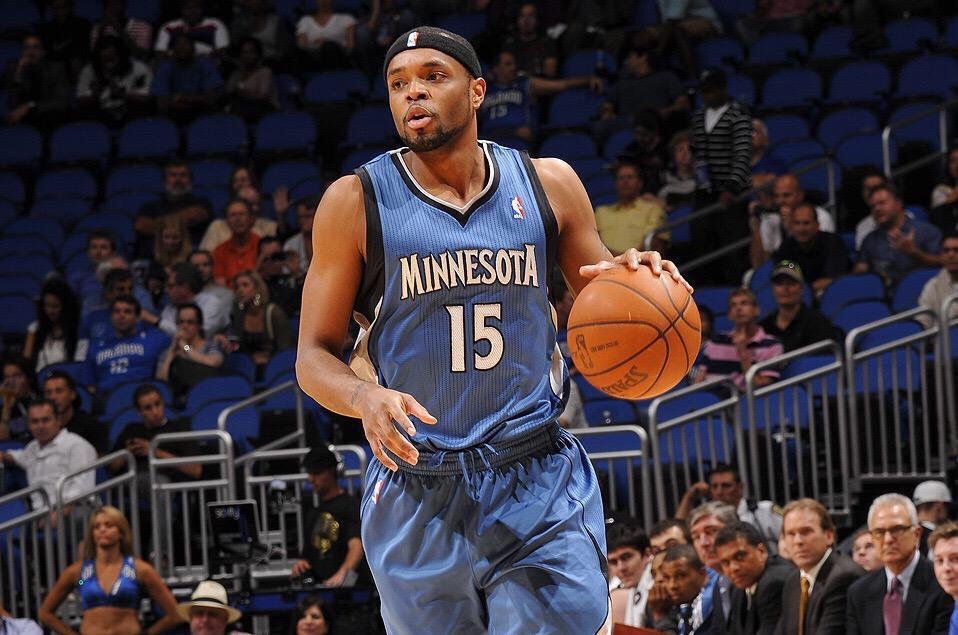
Image courtesy of Maurice Ager/Twitter.
Jeffrey Kee: Maurice, you were born and raised in Detroit, Michigan. You’re a graduate of Crockett High School. Talk about your upbringing a little bit.
Maurice Ager: My childhood was great. I did everything that a child should do. I did martial arts, basketball, and played football around the neighborhood. I had a lot of fun. When I was young, I didn’t realize how tough the area was until I got a little bit older, but overall it was great.
JK: Do you come from a basketball family?
MA: Not at all. I’m the only person in my family that I know of who plays basketball.
JK: Growing up in Detroit and having hoop dreams, were local products like Jalen Rose and Chris Webber inspirations of yours?
MA: Oh yeah, definitely. I grew up a huge “Fab Five” fan. I wasn’t necessarily a big Michigan fan, but I loved watching them play. Chris Webber, Jalen Rose, Jimmy King, Ray Jackson and Juwan Howard – those guys were inspirational to me growing up. Just the way they carried themselves with the long shorts and black socks; that had a huge impact on me. They definitely put on for the city for sure.
JK: As a high school senior, ESPN ranked you as the 31st best player in the nation. You were ranked as the second best shooting guard at the famed ABCD Camp behind LeBron James. What do you remember most from playing at ABCD?
MA: It was a lot of fun. I had a great time. I feel like I played well. I made the all-star team and everything. Getting invited and having the opportunity to play on such a high level was a dream come true. A lot of college coaches and scouts were there. I got a chance to play against Carmelo Anthony, LeBron, Deron Williams and Lenny Cooke; just to name a few. That year produced some of the most talented players of our generation.
JK: You mentioned Lenny Cooke, who a lot of people don’t remember, but, at one point, was on par with guys like LeBron and Carmelo. Even though he never made it to the league, competing against him at the camp, did you see star potential?
MA: Yeah, I think he was just one of those guys that got caught up in life a lot earlier than he should have. I think that took away a lot of his focus and lot of his drive. At the time, though, he was a fantastic player. I still remember watching that famous matchup when LeBron scored 36 points on him and Lenny only had four.
JK: Who did you enjoy competing against the most in high school?
MA: That’s a great question. There’s so many. Lenny was one of them. Carmelo, LeBron, Deron Williams, Dee Brown, Allen Ray; I loved competing against those guys as well.
JK: Being ranked as high as your were your senior year, did you ever consider making the jump from high school to the NBA?
MA: Not seriously. I remember speaking about it with one of my coaches, but at the time I wasn’t quite ready to play in the NBA.
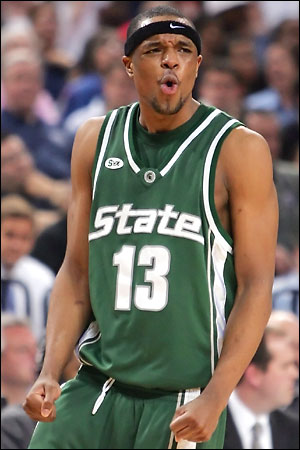
Image courtesy of Maurice Ager/Twitter.
JK: I also read that you originally committed to play for University of Missouri, but had a change of heart and decided to sign on with Tom Izzo and Michigan State. What went into that decision?
MA: I really did that for my mother. She wanted me to stay close to home. Having Tom Izzo as my head coach was a huge factor as well. He was doing such a great job building the program – they were winning and a lot of their players were going to the NBA, so I felt very comfortable going there.
JK: Growing up a “Fab Five” fan, did you consider playing for the Wolverines?
MA: I didn’t because, at the time, Michigan was banned from playing in the NCAA tournament, so I didn’t even consider going there to play.
JK: Your rise to basketball stardom at Michigan State was steady. You averaged seven points as a freshman, nine as a sophomore, but your junior year is when you really started gaining national attention. What do you remember most from your junior year and, more specifically, advancing to the Final Four?
MA: Yeah, my junior season was my breakout year. It was the first time I had the opportunity to start consistently. I led the team in scoring during the season and during the tournament run. That year we made history. We beat Duke and Kentucky in the same weekend. Advancing to the Final Four was a huge moment for our program. Looking back, it was just a wonderful time in my career.
JK: You scored 21 points in that double overtime game against Kentucky to advance to the Final Four. Where does that game rank among your all-time best.
MA: I’d say it’s in the top two. The Maui Invitational game against Gonzaga (36 points) was probably my best and the Kentucky performance is second.
JK: Your senior season, you guys were, at one point, ranked 5th in the nation, you averaged nearly 20 a game, but ultimately, the year ended disappointingly with a loss to George Mason in the first round of the NCAA Tournament. Would you say that was the most disappointing loss of your career?
MA: Yeah, it was definitely disappointing because I left like we had a really talented team and could have probably made it back to the Final Four. We just ran into a really hot team in George Mason. They’re one of the biggest Cinderella teams of all-time. They ended up advancing all the way to the Final Four, so we didn’t feel so bad about it. I played well that game though. I scored 28 points, which is ironic because I had 28 in my final high school game as well.
JK: Overall, what was it like being a star athlete at a sports crazed school like Michigan State?
MA: It was a blast; definitely some of the best times of my life. I’m a people person, so I hung around everyone. I would love to go back to college for a month and experience everything as a regular college student and not as an athlete.
JK: On that Michigan State team, everyone talks about Shannon Brown being the high flyer, but you had hops yourself. Did you two ever have dunk off’s in practice?
MA: Not really. We just tried to go out there on the court and get buckets. We never really got caught up in who had more hops. Of course, he had more hops than I did, but I could get up there too. He and I had a lot of fun competing against each other. Being on the same court as him made me a better player.
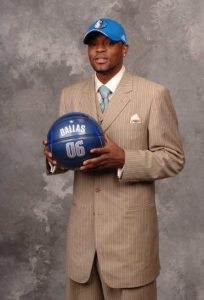
Image courtesy of Maurice Ager/Twitter.
JK: After your senior year, you entered the NBA Draft. I read that you worked out for 25 different teams.
MA: That’s right. I think I still hold the NBA record for most pre-draft workouts. The year after, the league placed a limit on how many teams a player could work out for. At the time, I didn’t know any better. My agent told me to go workout for all these different teams, so that’s what I did. I was lucky I didn’t get hurt. Doing 25 different workouts every other day, my body got tired, which is why I don’t think I had the best showing for certain teams. If I could go back, I would have cut that number in half and wouldn’t have worn myself out like that.
JK: Ultimately, though, it paid off. You were selected with the 28th overall by the Dallas Mavericks. What do you remember most from draft night?
MA: It was nerve-racking, man. It’s funny because I didn’t even workout for the Dallas Mavericks, but they still ended up drafting me. I was a little surprised to have fallen late in the first round because I felt that I was one of the top guys coming out of college, but that’s how the ball rolls sometimes. I wouldn’t change that experience for anything. Going out there and playing for the Dallas Mavericks and Mark Cuban was a dream come true. That night proved to me that if you keep a positive attitude, everything will work out.
JK: Speaking of Mark Cuban, being a businessman yourself, did you learn anything from him that has helped you succeed in the corporate world?
MA: Oh yeah, definitely. Playing for the Mavericks, I had the opportunity to pick his brain and learn from him. I feel like, to this day, Mark has a lot of respect for me because of my mindset. At the time, I didn’t know that I was going to be an entrepreneur this early into my life. But I was always intrigued by him and wanted to know how he became the successful billionaire he is. Even today, he and I still talk, we email back and forth and he gives me advice. I’ve got a lot of love for Mark.
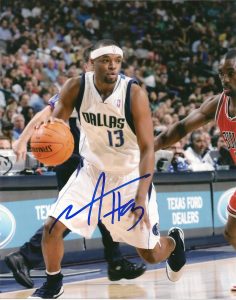
Image courtesy of eBay.
JK: Your rookie year, the Mavericks were fresh off of a loss to the Miami Heat the NBA Finals (2006). The team was jam packed with veterans –Dirk, Jason Terry, Devin Harris, Josh Howard, and Jerry Stackhouse to name a few. What were your expectations coming in both from an individual and team prospective?
MA: As a competitor, I wanted to go out there and cook, but considering the team had gone to the Finals the year before and had their core group returning, I knew that I had to wait my turn. As a team, I felt that we were good enough to make another Finals run. For the most part, my rookie season was a transition period for me. It was a huge learning experience where I had to figure out how to handle myself as a professional and realize that I was in the NBA; I wasn’t in college anymore. Most of my teammates were a lot older. A lot of them had families. That was a huge adjustment for me, but overall I had a great time playing in Dallas.
JK: As one of the young guys on the team, did any of the veterans take you under their wing?
MA: Yeah, definitely. Guys like Josh Howard, Jason Terry, Greg Buckner, Devean George and DeSagana Diop. Having them around was huge for me. Those guys were great.
JK: That year (2006-07) you guys won 67 games during the regular season, entered the playoffs with the No. 1 seed and were then famously upset by the eighth-seeded, Baron Davis led, Golden State Warriors. What was that feeling like? What was the locker room like after losing in Game 6?
MA: It was disappointing. We had the best record in the NBA that year. We just ran into a hot Golden State team. There wasn’t really much we could do to stop them. They were just on such a roll. Even though we lost, it was still a really exciting series to be a part of. I was excited that I had the opportunity to play that series. I thought that I played pretty well when I got the chance.
JK: What was it like playing for Avery Johnson?
MA: Avery was “The General.” He was very strict. He was basically like a college coach, but on the NBA level. He was really tough on the guys. He was very tough on me as well. But overall, he was a great coach. He understood X’s and O’s better than anybody. He’s a former NBA champion and he put in the work every day to be great at what he did.
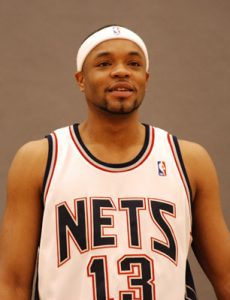
Image courtesy of Nets Daily.
JK: That next season, you were involved in the Jason Kidd trade that sent you to the Nets. Was it demoralizing going from a championship contender one day to a lottery bound team the next?
MA: Well, the NBA in general is night and day. Being traded was a bit of a tough situation to go into because the Nets had been losing and the team’s spirit wasn’t as high as it had been on the Mavericks. But I really enjoyed playing with Vince Carter. [President of Basketball Operations] Rod Thorn was a good friend of mine. It was still a great experience for me.
JK: After New Jersey, you spent a little bit of time with the Minnesota Timberwolves as well. You once said that of any coach you played for in the NBA, Kurt Rambis was your favorite. Why is that?
MA: I feel like Kurt really wanted to work with me. He really pulled for me. He spent time helping me learn the offense. Just as people, he and I liked each other a lot. He’s really laid back. I really enjoyed playing for Kurt. He’s just a really cool dude.
JK: You also had a bunch of stints in the D-League. A lot of teams use the D-league as a way to develop their players and instill confidence in them, but from a player’s perspective, what was that experience like for you?
MA: My last season with the Maine Red Claws was actually the most fun I ever had as a professional athlete. I had a great time playing with them because I was given the opportunity to play. I was getting consistent minutes. The team had a great group of guys. The crowd in Maine was always fantastic. Everything about it was fun. I felt like I was playing for the love of the game again, like when I was a kid.
JK: Having been in the NBA locker room for a number of years, describe the league’s spending culture.
MA: Well, everyone’s different. Some players get their checks and want to buy a bunch of cars. Others want to dress in designer suits every day. My main concern was getting my mom out of Detroit. That was the most important thing to me.
JK: Transitioning into your music career. Music’s always been a huge part of your life. In 2013 you received a Grammy nomination for your single, “Far From Home.” What was that experience like?
MA: It was a great experience, man. I still love having that title. Being a Grammy nominated musician is a wonderful thing because music has always been my passion. My plan is to hopefully win one. My career as a musician is the second chapter in my life, so to have been recognized for my work on that level was an extraordinary feeling.
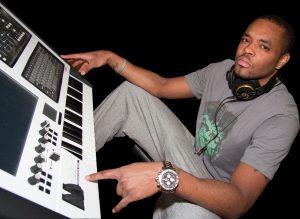
Image courtesy of Ager Music.
JK: You started writing songs when you were six and began producing as a teenager. As a kid, what meant more to you, being a great basketball player or being a great musician?
MA: The two kind of go hand in hand, but music has always been something that I’ve cherished. It’s something that I’ve known I wanted to pursue my entire life. You can’t play basketball your entire life, but you can be a musician forever.
JK: You’ve worked with music legends like Royce Da 5’9, E-40, and B-Real from Cypress Hill. Which artist have you enjoyed collaborating with the most?
MA: I’d have to say Royce Da 5’9 because I grew up a huge fan of his. He’s a Detroit guy, so he was someone I really admired as a kid. Having the opportunity to work with him was a dream come true for me.
JK: Who are some of your rappers of all time?
MA: My favorites are probably Eminem, Tupac, T.I., and Royce Da 5’9. I’ll probably put Kendrick Lamar up there as well.
JK: What about outside of rap?
MA: Marvin Gaye for sure. He’s my favorite musician of all time by far. I also like Michael Jackson, Earth Wind and Fire, The Temptations, Stevie Wonder, and Anita Baker; any of the original Mo-Town artists.
JK: A lot of NBA guys have mingled in the rap game – Shaq, Kobe, Iverson, and Stephen Jackson. In your opinion, who are some of the best rappers to have played in the league?
MA: Shaq was probably the best. Chris Webber was okay. Allen Iverson was nice. Damian Lillard is actually pretty dope. Iman Shumpert is pretty good too.
JK: A lot of people want to generalize rap music and say that the only things artists are talking about nowadays are sex, drugs, money, and violence. What do you think of the current state of hip-hop?
MA: As far as rap music goes, I think the quality of music has dropped tremendously. In hip-hop, though, I think we have a few guys holding it down right now – J. Cole, Kendrick, I would even throw Drake into that conversation too. Then there’s Chance the Rapper, Big Sean, and Wale. There are a lot of dope artists out there. Some of these guys you won’t hear on the radio very much, but their putting out some great stuff.
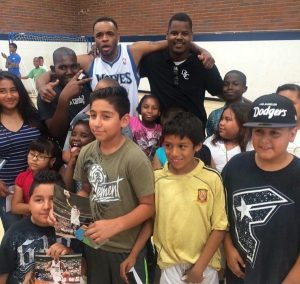
Image courtesy of Maurice Ager/Twitter.
JK: Do you have any aspirations to re-enter college or professional basketball at the coaching level?
MA: Never! I don’t have the patience to be a coach. You really have to be a special individual to be a successful coach. I have a hoops school, though. I run “Moe Ager Hoop School”, which is a basketball enrichment program that I started a few years ago that’s doing really, really well. We’re based out of Southern California. We have five or six locations. I’m very hands on. I’m there every day teaching drills, giving kids advice and cheering them on. I leave the more detailed instruction to my coaches, but I’m at the gym working with the kids all the time.
JK: What type of message do you want to send to your campers?
MA: I want them to learn discipline. I want to teach them how to pay attention to detail and how they can improve their fundamentals. I want them to understand that if they want to be great players, they’ll need to dedicate themselves to the game outside of the camp. I tell them a lot of stories too. I tell them about things I went through as a child; stories from the NBA as well. I’m there to help lift them up and inspire them to not only be great basketball players, but to be great people.
JK: Last, but not least: how do you want to be remembered?
MA: I want people to remember me as a person who uplifted humanity.













